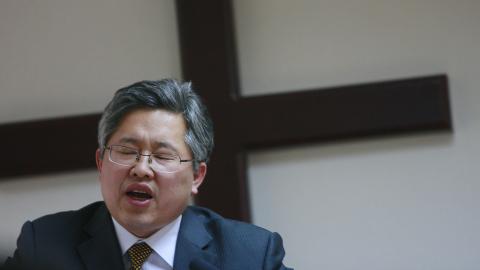Donald Trump has done what no other American president could do: broker peace in the Middle East. The Israeli hostages are home, and the war in Gaza, at least for the moment, is over. The future of Hamas is yet to be settled, and many questions about the region’s next steps remain unanswered. But Trump has demonstrated an unrivaled ability to negotiate peace among warring factions. More than any president since Ronald Reagan, he understands that there can be no peace without overwhelming power and moral clarity. American strength, and Trump’s willingness to use it, are making the Middle East safer, freer, and more stable. The Trump team’s moral clarity — that any peace deal must begin with Hamas releasing the Israeli hostages — reduces Hamas’s incentives for future aggression and increases the chances of a lasting peace.
At the end of October, Trump will travel to South Korea for the Asia-Pacific Economic Cooperation (APEC) summit. During this gathering, he will meet with Chairman Xi Jinping to continue trade negotiations. Trump should apply his playbook for success in the Middle East to the Indo-Pacific.
This peace deal between Israel and Gaza wasn’t guaranteed. Imagine if Trump had listened to advisors in his first administration who counseled against rejecting President Obama’s nuclear deal with Iran. The Joint Comprehensive Plan of Action (JCPOA) allowed Tehran to continue funding terrorist groups like Hamas and Hezbollah, permitted Iran to build more ballistic missiles, and traded up-front sanctions relief for future promises of peace. It was the epitome of weakness, but many senior officials tried to convince Trump that stability, not strength, leads to peace. Trump rightly ignored this advice, pulled out of the JCPOA, and hit Iran with maximum economic pressure and targeted military strikes. The regime in Tehran was left reeling.
This past summer, when Israel targeted Iran, more voices insisted that America was on the verge of World War III. Tucker Carlson warned that “an attack on Iran could very easily become a world war,” one that America would lose. Instead, Beijing and Moscow looked on as American B-2 bombers entered Iranian airspace and dropped X bombs on Fordow and Natanz. Trump understood then and now that weakness provokes authoritarian dictators. Sometimes giving war a chance is the only way to get a lasting peace. That is why Hamas released the twenty remaining living Israeli hostages: not out of the goodness of their hearts or endless diplomatic negotiations, but because of American leadership. Moral clarity and unrivaled power from Washington have brought the best chances of peace to the world’s most turbulent region.
What does all this mean for China? Much like Hamas, the Chinese Communist Party (CCP) holds hostages of its own — political prisoners brave enough to serve a higher power than an atheistic party-state. Among them are Pastor Ezra Jin, a Christian minister of Zion Church in Guangxi, and Gulshan Abbas, a Uyghur doctor in Xinjiang. Pastor Jin was recently detained in Beijing, along with dozens of other church leaders, and Dr. Abbas has been imprisoned for over seven years.As the Trump-Xi meeting at APEC grows closer, the president’s team is working to stabilize U.S.-China relations and make progress on trade talks. That’s a good goal, but Trump should remember his recent success with Hamas: sometimes short-term escalation brings long-term stability. America cannot be at peace with a Leninist regime in Beijing that rejects American values and endangers family members of U.S. citizens. Pastor Jin and Dr. Abbas both have family in America. As a first order of business, Trump should secure their release.
Thankfully, Trump has the right team in place to accomplish this. Secretary of State Rubio condemned the CCP’s recent detention of dozens of Christian leaders and called for their immediate release. Rubio has called for the immediate release of Dr. Abbas since he was a U.S. Senator and was a champion of political prisoners for years while serving in the Senate.
President Trump has appointed former Congressman and former Southern Baptist pastor, Mark Walker to be the next U.S. Ambassador-at-Large for International Religious Freedom. Appointing Mr. Walker signals that international religious issues remain an administrative priority. As the Trump Administration rightly understood in its first term, religious freedom is not only a moral imperative, but it carries with it diplomatic leverage and power.
As Trump has rightly said, religious liberty is a cornerstone of American democracy, and as the leader of the most powerful nation on earth, he should use his power to secure the immediate release of Pastor Jin, Dr. Abbas and the hundreds of other detained political prisoners.
President Trump should receive global recognition for his indispensable role in bringing home the twenty living hostages. We celebrate this achievement and rejoice that families are reunited, while mourning the loss of life as the peace deal was being finalized. We call on President Trump to continue leading on the global stage with clarity and conviction, and to help bring these Chinese political prisoners home.
















